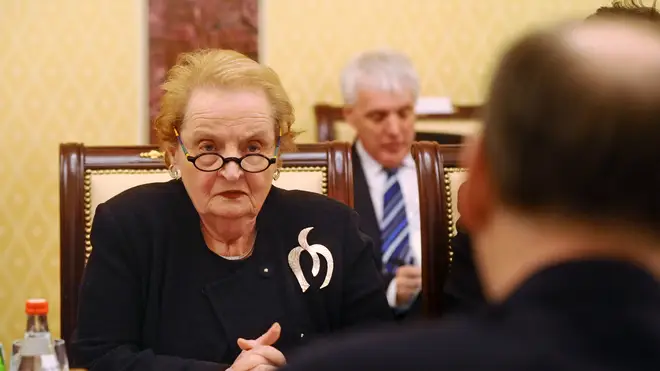
Ian Payne 4am - 7am
23 March 2022, 22:08 | Updated: 24 March 2022, 00:44

Madeleine Albright, the first female US secretary of state, has died of cancer aged 85, her family said.
President Bill Clinton chose Ms Albright as America's top diplomat in 1996 and she served in that capacity for the last four years of the Clinton administration.
At the time, she was the highest-ranking woman in the history of US government.
She was not in the line of succession for the presidency, however, because she was a native of Czechoslovakia.
Read more: Florida governor rejects Lia Thomas swim victory and hands win to runner-up
Read more: 'What more can I do?': Mum with 3 jobs and no heating calls LBC to beg Sunak for help
"She was surrounded by family and friends," her family announced on Twitter.
"We have lost a loving mother, grandmother, sister, aunt and friend."
Former president George W Bush said: "Laura and I are heartbroken by the news of Madeleine Albright's death.
"She lived out the American dream and helped others realise it... She served with distinction as a foreign-born foreign minister who understood first hand the importance of free societies for peace in our world.
"I respect her love of country and public service, and Laura and I are grateful to have called Madeline Albright our friend."

Simon Marks remembers legacy of Madeleine Albright
Linda Thomas-Greenfield, US envoy to the United Nations, honoured Ms Albright as a "trailblazer and a luminary" in remarks on the General Assembly floor shortly after news of her death emerged.
"The impact that she has had on this building is felt every single day and just about every single corridor," said State Department spokesman Ned Price.
"She was a trailblazer as the first female Secretary of State and quite literally opened doors for a large elements of our of our workforce," he said.
In 2012, President Barack Obama awarded Ms Albright the Medal of Freedom, the nation's highest civilian honour, saying her life was an inspiration to all Americans.
Read more: 29 hospitalised after 'high quantity of chlorine gas leak' at Olympic pool
Read more: Urgent warning issued to Londoners over 'extremely dangerous toxic air'
Ms Albright remained outspoken through the years.
After leaving office, she criticised President George W Bush for using "the shock of force" rather than alliances to foster diplomacy and said Mr Bush had driven away moderate Arab leaders and created potential for a dangerous rift with European allies.
However, as a refugee from Czechoslovakia, she was not a dove and played a leading role in pressing for the Clinton administration to get militarily involved in the conflict in Kosovo.
She also toed a hard line on Cuba, famously saying at the United Nations that the Cuban shooting of a civilian plane was not "cojones" but rather "cowardice".
She advised women "to act in a more confident manner" and "to ask questions when they occur and don't wait to ask".

Simon Marks reports on divisions in the Republican party on Ukraine policy
"It took me quite a long time to develop a voice, and now that I have it, I am not going to be silent," she told HuffPost Living in 2010.
When the Senate Foreign Relations Committee asked her in January 2007 whether she approved of Mr Bush's proposed "surge" in US troops in bloodied Iraq, she responded: "I think we need a surge in diplomacy. We are viewed in the Middle East as a colonial power and our motives are suspect."
Ms Albright was an internationalist whose point of view was shaped in part by her background. Her family fled Czechoslovakia in 1939 as the Nazis took over their country, and she spent the war years in London.
As secretary of state, she played a key role in persuading Mr Clinton to go to war against the Yugoslav leader Slobodan Milosevic over his treatment of Kosovar Albanians in 1999.
"My mindset is Munich," she said frequently, referring to the German city where the Western allies abandoned her homeland to the Nazis.
She helped win Senate ratification of Nato's expansion and a treaty imposing international restrictions on chemical weapons.
"I am an eternal optimist," Ms Albright said in 1998, amid an effort as secretary of state to promote peace in the Middle East. But she said getting Israel to pull back on the West Bank and the Palestinians to root out terrorists posed serious problems.
As America's top diplomat, Ms Albright made limited progress at first in trying to expand the 1993 Oslo Accords that established the principle of self-rule for the Palestinians on the West Bank and in Gaza.
But in 1998, she played a leading role in formulating the Wye Accords that turned over control of about 40% of the West Bank to the Palestinians.
She also spearheaded an ill-fated effort to negotiate a 2000 peace deal between Israel and Syria under Syria's late President Hafez al-Assad.